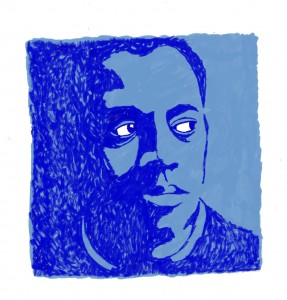
Guillem d’Efak
We, the people in Mallorca are in debt with Guillem D’Efak. No one has singed to the lonely hearts, the unhealed wounds, the beauty of the body and the passion for the noble ideas as he has. No one has singed “Vell riu nostre” or “Mai de mais” or “Com ahir” (an adaptation of the classis “As times goes by” from the film Casablanca) with that generosity that only exceptional people have. I mean poets. Guillem, an expatriated, a black guy, a cheerful weirdo that enlightened the dull streets of Manacor during the postwar period with his baritone voice.
He was born in Equatorial Guinea, son of a colonial guard and, according to him, a Paume princess, and he arrived on the island when he was 3 years old to the consternation of neighbours from Manacor (we need to keep in mind that we are talking about the 30s of the XX century and the word “multiculturalism” simply does not exist). But it was in Barcelona where he started to play his cards. The legend says that he hit music by accident. It seems that it happened in a cabaret in Palma: one night, the usual band needed a replacement to play the maracas and the second voices while the girls with Carmen Miranda style headdresses danced with joy. He tried and he succeeded. That good experience on stage encouraged him to try his fortune in the renewed folk atmosphere of Barcelona. The rest is history. There is this one feature that distinguishes Guillem D’Efak from the rest of the Steze Jutges (which translates to Sixteen judges, a group of songwriters that defended the Catalan language as an expression freedom and identity during the years of Franco’s repression), and it is his audacity when mixing genres, his uncanny modernity: Guillem would not blink when singing Jazz with Manacor accent (and what accent!) or introducing Hendrix’s style acidic guitars in “Inventantari of Tardor”, garnishing with epic Ennio Morricone-like orchestrations the anthem “Sa Cançó de Son Coletes” (dramatic anti-war allegation that circumvented censorship), or transmuting into crooner like Gilbert Becaud in the beautiful Avemaria de Robines.Just imagine the impact that he must have caused in a scenario in which all were acoustic guitars and long hair in the wind, an unprejudiced nigger with a voice capable to pull the entire Capitol, singing blues and jazz in Mallorca with that casual not-overthinking air. Guillem seems to have been one of these guys whose talent overflown him. You can tell form his pictures: a smiling man, always relaxed, looking at us from the top down with that mocking grin that seems to say “it is not such a big deal!” and at the same time warns us of a wonderful landscape that is about to arrive. . His legacy is not limited to music, he claimed himself as a poet rather than a musician. He wrote, directed and starred in some plays (J.O.M., La mort de l’avia, Paisajexlindos), poetry (El poeta i el mar; Madona i l’arbre, with which he was awarded the Carles Riba in 1966; El poeta i la nina) and narrative (Les vacances den Jordi; La Ponentada).
Once music stopped being a game, he abandoned the stages and went back to Mallorca to give another twist to his extraordinary biography. In this final stretch of his life, our smiling bard was devoted to show the benefits of our island to foreigners on a tour bus. It bothers me to imagine the indifference of those tourists to the phaenomenon that was pointing them this and that monument or landscape, but that is the way it was and, in any case, this last play honours him and emphasizes its heterodox personality. There has been no one like him afterwards.
Todos los mallorquines estamos en deuda con Guillem D’Efak. Nadie como él ha cantado a los corazones solitarios, a las heridas sin cicatrizar, a la belleza del cuerpo y a la pasión por las ideas nobles. Nadie ha cantado “Vell riu nostre” como él, ni “Mai de mais” ni “Com ahir” , (adaptación del clásico “As times goes by” del film Casablanca) con esa generosidad que posee la gente excepcional. Es decir, los poetas. Guillem, un expatriado, un negro, un tipo raro y alegre que iluminó las calles tristes y pobres de Manacor en la posguerra con su voz de barítono.
Nacido en Guinea Ecuatorial, hijo de un guardia colonial y ,según afirmaba, una princesa Pàmue, llegó a la isla a los 3 años para consternación de los vecinos Manacorins, (estamos en los años 30 del siglo XX y la multiculturalidad es una palabra que sencillamente no existe) pero fue en Bcn donde empezó a jugar sus cartas con maestría de tahúr. Cuenta la leyenda que llegó a la música por accidente. Parece ser que sucedió en un cabaret de Palma: Una noche la banda del local necesitaba un sustituto que tocara las maracas y pusiera segundas voces mientras las chicas con tocados tipo Carmen Miranda bailaban. Lo probó y acertó. Esa grata experiencia sobre el escenario le animó a probar fortuna en Barcelona aprovechando los aires de renovación folk que allí se vivían. El resto es historia. Hay una característica que diferencia a Guillem d’Efak del resto dels Setze Jutges (grupo de cantautores que reivindicaron la lengua catalana como expresión de libertad e identidad durante los años de represión franquista) y es su audacia a la hora de mezlcar géneros, su modernidad asombrosa: Guillem no pestañeaba al cantar Jazz con acento (¡y qué acento!) manacorí o introducir guitarras ácidas tipo Hendirx en “Inventantari de Tardor”, adornar con épicas orquestaciones a lo Ennio Morricone el himno Sa Cançó de Son Coletes ( dramático alegato antibelicitsa que sorteó la censura), o transmutarse en cantante melódico a lo Gilbert Becaud en la bellísima Avemaria de Robines. Imaginad el impacto que debió causar en un panorama en que todo eran guitarras acústicas y melenas al viento escuchar a alguien como él, un negrazo sin prejuicios y voz para tirar el Capitolio entero, cantar blues y jazz en mallorquín con ese aire de no pensar demasiado, de no sopesar los riesgos. Guillem parece que era uno de esos tipos cuyo talento le desbordaba. Se ve en las fotografías: un hombre sonriente, relajado, que nos mira de hito en hito con esa mueca burlona que parece decirnos: ¡nada es tan grave! y a la vez nos avisa de un paisaje maravilloso que está por llegar. Su legado no se detiene en lo musical,él mismo se reivindicaba como poeta antes que músico. Escribió , dirigió y protagonizó algunas obras de teatro (J.O.M., La mort de l’avia, Paisajexlindos), poesía (El poeta i el mar; Madona i l’arbre ,con el que ganó el Carles Riba del 66; El poeta i la nina) y narrativa (Les vacances den Jordi; La Ponentada).
Una vez la música dejó de ser un juego y ciertas luchas terreno abonado para la demagogia abandonó los escenarios para regresar a Mallorca y dar otra vuelta de tuerca a su extraordinaria biografía. En este tramo final de su vida nuestro bardo sonriente se dedicó a mostrar en un autobús turístico las bondades de nuestra isla a los extranjeros. Me molesta imaginar la indiferencia de esos turistas ante el portento que les va señalando tal monumento o paisaje, pero así fue, y en todo caso esa última jugada le honra y acentúa su carácter heterodoxo.No habido nadie como él después.
Text by Jordi Maranges


+ There are no comments
Add yours